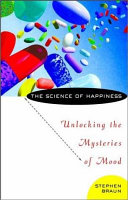
The Science of Happiness
By - Braun, Stephen
Floor
-
Floor 2
Published
-
Wiley, New York, ©2000
ISBN 10 - 0471417238
ISBN 13 - 9780471417231
Book Status
-
1 Qnty Available with us.
Subject
-
Antidepressants
Shelf No
-
10
common.call_no
-
616.8527 BRA
common.physical_description
-
xvi, 192 pages ; 23 cm
Notes
-
Include Index